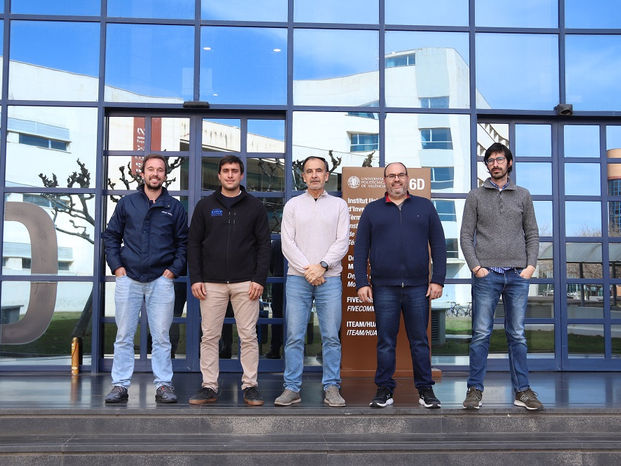Improving the safety of lithium-ion batteries in electric vehicles
Better understanding of the problems associated to the thermal runaway of lithium-ion batteries
Advertisement
Researchers from the Universitat Politècnica de València (UPV), belonging to the CMT-Motores Térmicos research institute, are working on different national and international projects to improve the safety of lithium-ion batteries, the most currently used in electric vehicles.

Researchers of the CMT-Motores Térmicos Institute (UPV, Spain)
UPV
As pointed out by Antonio García, researcher at CMT-Motores Térmicos, the future of the automotive sector depends, to a large extent, although not exclusively, on the massive use of lithium-ion electric batteries, although there are currently some problems that may affect your safety. One of them is its thermal stability.
“Lithium ion batteries under certain conditions are not safe. There is a phenomenon known as thermal runaway, which can end up causing the battery to catch fire, with the consequent risk to the occupants of the vehicle. The thermal energy released during this process is around 5.4 times the electrical energy contained in the battery, so extreme precautions must be taken. Thermal instability of batteries can occur under high demand conditions, for example during fast charging. If this is not managed well, it can go into thermal runaway and start a fire. As a note, a German city has already prohibited the parking of electric cars in underground garages,” explains García.
To reduce these risks, the UPV's CMT-Motores Térmicos team is currently working in two European and two other national projects whose objective is to better understand all the problems associated to the thermal runaway of lithium-ion batteries, both current and those that will reach the future market in the next fifteen years.
“We are applying our more than 40 years of work focused on combustion engines to understand this phenomenon that affects lithium-ion batteries. We want to know even the smallest detail of the combustion process in batteries to help make them as safe as possible. And we already have our first results,” points out Javier Monsalve.
One of them is the development of an experimental installation, in collaboration with AVL Ibérica, to be able to visualize how the combustion process of a battery develops. Along with the analysis of the gases emitted, it will be possible to carry out a physical-chemical characterization of the process under different conditions such as different state of charge states, composition of the environment, etc., which will allow the development of chemical kinetic mechanisms associated to the process.
In addition, the UPV team is working on the DETEBAT-VE project, financed by the Generalitat Valenciana, focused on reorienting companies that currently provide services to Ford Almussafes towards electrification.
“The objective of the project is to create a high-energy content battery pack demonstrator that allows the development and validation of the essential technologies to increase its driving range, safety and sustainability. From the CMT we work on the aspects of safety, thermal control and development of the battery energy management system,” Monsalve points out.
Original publication
Other news from the department science
These products might interest you
Most read news
More news from our other portals
See the theme worlds for related content
Topic World Battery Technology
The topic world Battery Technology combines relevant knowledge in a unique way. Here you will find everything about suppliers and their products, webinars, white papers, catalogs and brochures.

Topic World Battery Technology
The topic world Battery Technology combines relevant knowledge in a unique way. Here you will find everything about suppliers and their products, webinars, white papers, catalogs and brochures.




























































